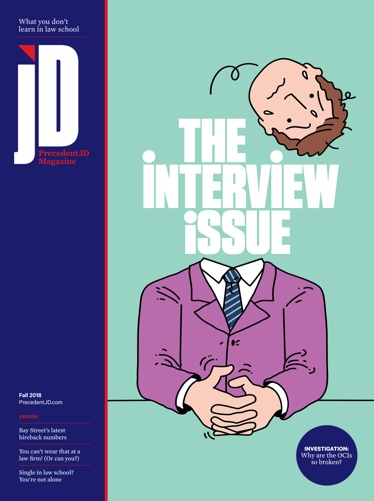
During an on-campus interview last year, a law-student friend of mine spent five minutes talking about karaoke. You might see that as problematic, since one’s ability to belt out pop songs is an unlikely predictor of law-firm success. You might find it even more troubling to learn that my friend didn’t mention karaoke on her resumé or her cover letter. But the real offence? The interviewers were playing into a racial stereotype, assuming that, since my friend is Asian, she must like karaoke. There really is no other possible reason for them to broach this topic.
That, in a nutshell, reveals everything that is wrong with OCIs. As this issue’s cover story (“The OCIs are Broken,”), written by PrecedentJD’s senior editor, Daniel Fish, makes plain, the entire hiring process — from the initial interview to the high-stakes dinners — is flawed. And no one knows how to fix it.
But I have an idea. Imagine going through OCIs without ever leaving your house. I know, I know. Kind of antithetical to the whole “on-campus” thing, but hear me out. In the comfort of your own home, and at a time of your choosing, you open your laptop. You follow a link to your potential employers’ interview page, where you’ll find a list of questions. Next, you record a video of yourself answering each one. Feel a bit nervous? Stumbling over a few words? No problem. Hit erase and re-record your answer. Once you’ve nailed all the questions, it’s time to submit.
Can you see why this makes so much sense? First off, it’s way less stressful. Better still, the list of questions is uniform. Employers will have no choice but to ask legit questions about skills and experience. No one will have to talk about karaoke.
This isn’t some pipe-dream idea. (Well, in law it might be.) In other industries, it’s already a thing. A couple of years ago I met a Toronto entrepreneur named Catharine Fennell, who founded a company called VideoBio. Her company lets employers do exactly what I’ve described above. Fennell has already helped accountants, pharmacists and universities implement video recruiting.
I ran this idea by my friend — who did not land a job at the firm with the karaoke enthusiasts, but did score a gig at a firm that asked about her legal skills and interests — and she was 100-percent in favour of putting it into practice. To her, it sounded like a way to make the process more fair and less stressful. So what are law firms waiting for? What will it take to turn on-campus interviews into on-camera interviews?

Melissa Kluger
Publisher & Editor
@melissakluger

This story is from the 2018 edition of PrecedentJD Magazine
